THE TITLE SAYS IT ALL
The most unfortunate thing about The Unfortunates is that a lot of talent (five writers, actually), having spent three years developing this new hybrid-musical, lacked a leader who could teach them how to tell a story. The show, directed by Shana Cooper and choreographed by Tiffany Rachelle Stewart, is consistently fascinating in staging and execution, but hardly any of the songs (which have 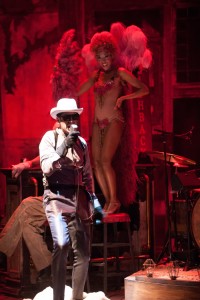 repetitive choruses) are self-contained or land and stick. The whole point of songs in a musical is that they are meant to heighten aspects of the story, but when a story is as slight as this one, the songs feel superfluous.
repetitive choruses) are self-contained or land and stick. The whole point of songs in a musical is that they are meant to heighten aspects of the story, but when a story is as slight as this one, the songs feel superfluous.
The problems began at curtain: Had I not glanced at the program, I would never have known that we are in some kind of “prisoner-of-war camp.” The dark, cartoonish, Brechtian atmosphere speaks anything but reality, yet that’s exactly what the creators want us to think we are seeing. One by one, prisoners are grabbed by a tall, stylized, sinister presence wearing sunglasses and a long, leather coat, and taken offstage to be shot. The prisoners are either sick or stoic as they softly sing sections of the famous standard “The St. James Infirmary Blues,” and defiantly slam their own fists into their chests twice, which looked like a ghettoized version of “Be Proud” or “Hold Your Ground” or something to that effect.
Suddenly we are thrown into a “shanty town” (again, from the program), and denizens of King Jesse’s Kingdom appear. There are birds (rooks) that look like a cross between Heckle and Jeckle and Spy Vs. Spy; an armless chanteuse whose father has died of “plague”; a gambling man with giant hands; a prostitute; a mad scientist-like doctor; and more. The idea is to take “The St. James Infirmary Blues” and cull from its lyrics a fable about the power of music to heal. But after 90 minutes, we feel cheated because there really is no story. And whatever story there is 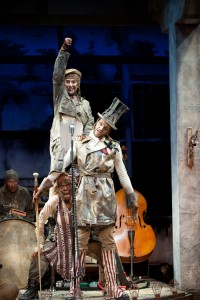 (the man with huge fists is in love with the armless singer during a plague during – I dunno – the 20s?) feels as if a wad of really cool ideas had been flung against a wall and the audience has to watch them slowly dribble down into a pile of unrealized dreams.
(the man with huge fists is in love with the armless singer during a plague during – I dunno – the 20s?) feels as if a wad of really cool ideas had been flung against a wall and the audience has to watch them slowly dribble down into a pile of unrealized dreams.
The show is a slew of ingredients: Allusions and metaphors are tossed in with blues, hip-hop and jazz, written mostly by musicians who clearly have a great love for American music. The Unfortunates is born of a generation that has much to say, but still hasn’t figured out the best way to say it. So what we end up with is part concert, part play, part musical and pure American goulash which reeks of self-importance (the four original creators are in the show). What exactly is the job of dramaturg Lue Morgan Douthit (who is also Director of Literary Development at OSF)? It’s staggering to watch so many characters dying of plague and not care – but how could we? We don’t know who anyone is.
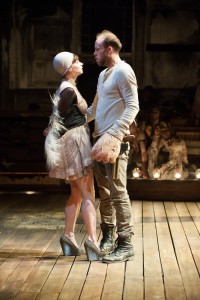 Far and away, the most successful song of the night is called “St. James Oasis” (or so I believe; there is no song list). In it, a ghoulish doctor (played by the superb Ramiz Monsef, one of the creators), explains how he duped those with plague that he promised to help. It has a quirky melody, moves the plot along, and helps to define character. You would be hard-pressed to find that in other areas of the show.
Far and away, the most successful song of the night is called “St. James Oasis” (or so I believe; there is no song list). In it, a ghoulish doctor (played by the superb Ramiz Monsef, one of the creators), explains how he duped those with plague that he promised to help. It has a quirky melody, moves the plot along, and helps to define character. You would be hard-pressed to find that in other areas of the show.
So, take away the great band (Casey Hurt, Jesse Baldwin, Mike Fitch, Joseph Porto), Sibyl Wickersheimer’s gorgeous set with hydraulic lifts, Katherine O’Neill’s whimsical costumes, Jiyoun Chang’s inventive lighting, the distinctive voice of Christina Acosta Robinson (as Roxy Boom Boom, another character with no back story), the mind-boggling antics of Jon Beavers, Rodney Gardiner and Barret O’Brien (as the zany, scurrilous, jiving rooks) and truly beautiful staging and clever dancing, and we simply have no there there. How unfortunate.
photos by Jenny Graham
The Unfortunates
Oregon Shakespeare Festival in Ashland
scheduled to end on November 2, 2013
for tickets, call 800.219.8161 or visit http://www.osfashland.com
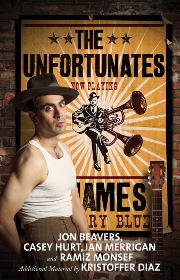
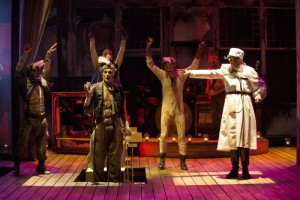

{ 3 comments… read them below or add one }
Huh…so you’re saying take away the great music, the gorgeous set, the whimsical costumes, inventive lighting, distinctive voices, mind-boggling acting, beautiful staging and clever dancing and there isn’t anything left? Yeah…yeah that makes sense. And if you took away the theatre there wouldn’t be a building.
Folks, just got back from Ashland. I’ve been going for years and this, along with Equivocation, 98’s Midsummer, and the recent All’s Well are in my top 5 favorite OSF productions. It’s amazing and I will be shocked if it doesn’t first transfer to Seattle or San Francisco and from there to either DC or NY.
Frankel seems to be indicating there isn’t much of a story and we don’t know who everyone represents. Clearly a lot of metaphors going on with many possible meanings. Plays that are both entertaining and have these aspects about them are rare…Brecht, Beckett etc. This is a play in that tradition. Reasonable people can come to different interpretations of what is being said about religion, alcohol, sex. Is this a play about external revolution or internal? Is Denmark a prison or just the nutshell of our mind? Is it better to have fun in soulless company or live virtuously alone? Where is salvation? How much and where should we fight? What is worth fighting for? Is it self-defeating? What is the plague of our time? Or is the play about something completely different? I don’t know, go to the show and we should talk about it…after you buy the soundtrack ’cause the music is so good.
Also…you wouldn’t have been able to tell it was a prisoner of war camp without the program? Wow….just…wow. Were the army uniforms too confusing? The sound design of approaching guard boots and clanking prison bars? The soldier/prisoners being pulled fearfully out of the room by a guard? The sounds of them being executed? I don’t read program notes until after shows and uh…while I had lots of questions about what each of the characters might represent (and lots of ideas)…it would really take a pretty spectacular amount of self-deception for me to pretend to not understand we were in a POW camp.
A generation with much to say, unsure how to say it? Pretty sure that’s been said by critics of every generation that has ever existed.
Okay, you didn’t like the show. That’s fine. Most great works of art are confusing, need a lot of exploring to unlock much of what is there. And not everyone likes that. And this one is caustic, which lots of people don’t like…nothing wrong with that. …but you are clearly having a REALLY hard time coming up with reasons you’re willing to admit to in public…and it sounds like you’re resorting to making things up (poorly). ‘Shame. Oh well, keeps the show from selling out too fast. Maybe I’ll get to go again!
All I can say is that my 17 year old actor daughter just came home from Ashland and can’t stop raving about this show, the music, the inspiration, the actors, their talent to the point of bringing me to tears. She’s convinced it’s the hit of the future and after reading Frankel’s review we both knew it was.
Those who have seen the show and heard the music mostly agree that the show is a great piece of work with songs that bring the story alive. However, Mr. Frankel, thought otherwise. “The dark, cartoonish, Brechtian atmosphere speaks anything but reality, yet that’s exactly what the creators want us to think we are seeing” (Frankel, 2013). Mr Frankel failed to see the symbols throughout the show that indicate the idea of illusion versus reality. From the sounds that are heard, lights used, and even the size of Joe’s hands, the creators made it clear when the show was inside of one world or the other. “The idea is to take “The St. James Infirmary Blues” and cull from its lyrics a fable about the power of music to heal. But after 90 minutes, we feel cheated because there really is no story” (Frankel, 2013). Correct in thinking that the idea of the story came from the jazz song “St. James Infirmary Blues,” Mr. Frankel failed to pay attention to show going on in front. As an audience member myself, it was clear to me that the show focused on the character of Joe as he battles his own fears of death. The “shanty town,” as Mr. Frankel kindly words it, is suffering from a sickness that is cursing those who have it to die. This mirrors Joe’s real life situation in the POW camp as he sees others around him being executed with no chance of survival. The story goes on to tell about how Joe walks through this valley of unfortunate souls and finds his courage to face his fear head on no matter the cost.